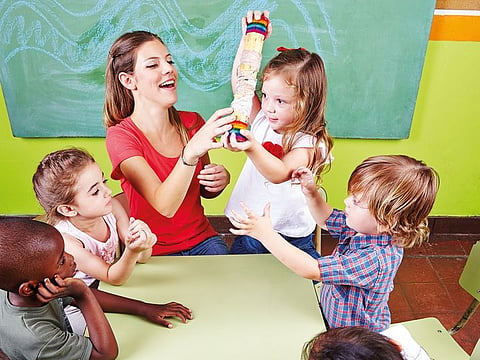Covid-19 encourages nurseries to challenge status quo
Early years educators are putting the child front and centre once again

During the peak of the pandemic, many parents were willing to forgo or postpone enrolling their children in nurseries to avoid exposure to Covid-19. But as restrictions lift and educational institutions return to face-to-face learning, is it time for parents sitting on the fence to have a rethink?
Recent research into the effect of disruptions in early childhood education and care in England as a result of the pandemic confirms what every early years educator worth their salt have feared – a negative impact on preschool children’s socio-emotional, behavioural and physical development as well as their school readiness.
Dr Vandana Gandhi, CEO and Founder of British Orchard Nursery, has seen this first-hand. “Closing schools has had a profound impact on children,” she says. “There is learning loss in terms of psychosocial and physical needs. Playful learning experiences are essential for children below six years to promote holistic development. Being confined at home restricts the opportunities for early stimulation like exposure to the outside environment.”
In addition to providing a safe and secure world outside their homes, full of opportunities for socialising with peers and interacting with authority figures, nurseries help children achieve greater gains in cognitive development, language acquisition, communication skills and literacy.
Lack of access may affect the proper development of these faculties.
With the pandemic forcing school closure, early years educators have had to look at new avenues to deliver quality and effective education. Many were encouraged to challenge the existing norms and put the child front and centre once again, says Dr Gandhi. “Developing online teaching skills practically overnight with a huge workforce across the Emirates in the midst of a lockdown was an incredibly steep learning curve. However, we discovered quickly what worked and what didn’t.”
The change though was not limited to the mode of delivery. The pandemic also offered educators an opportunity to redesign curriculums and rethink teaching philosophies. Needless to say, a curriculum drawn up during a pandemic is much more responsive to the times, with more sessions planned for and delivered outdoors.
“Children’s wants, interests and needs should always be at the heart of our educational philosophies,” explains Dr Gandhi. “However, this isn’t often the case as schools and teachers move closer towards a coverage and standard checklist-type of curriculum model. Every family in the world has had a different experience with Covid-19 and a different impact. So now more than ever children are coming to class at different starting points with different needs that outstanding educators need to respond to.”
And that’s not all. Today’s nurseries have a responsibility to not only meet children’s educational needs but also ensure they remain Covid-safe. “The DHA and KHDA have created comprehensive Covid-19 safety guidelines for all nurseries and schools to follow including establishing a health and safety team with dedicated trained team members,” she says. “In-school learning does not appear to be the main driver for the transmission of the Covid variant and this is proved by the effective risk mitigation measures taken by the nurseries.” She cites improving ventilation, encouraging bubble separation classes, forming sub-groups in classrooms, regular cleaning and sanitization drives, social distancing, mask-wearing by adults, hand washing, and vaccination among teachers as effective measures.



![Social media claims of cancellations dismissed; official updates to be shared through authorised channels. [Illustrative image]](http://media.assettype.com/gulfnews%2F2025-11-15%2Fx2mp12df%2Fexam.jpg?w=320&auto=format%2Ccompress&fit=max)